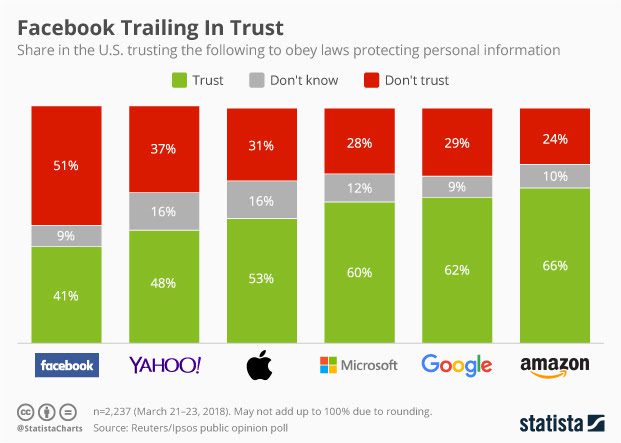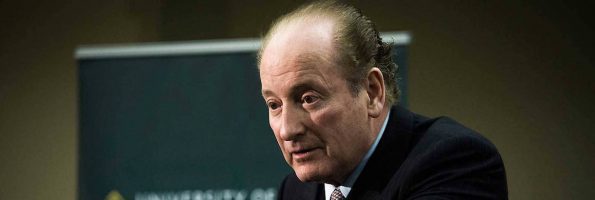What They’re Saying: The Facebook Fallout

It seems puzzling to say a company that is worth nearly half a trillion dollars is venturing somewhere near zero degrees Kelvin, but if you were only reading headlines this week you’d get the sense that Facebook isn’t looking so hot.
Since the break of the Cambridge Analytica scandal, the tech giant lost an estimated $100 billion USD in value, and its beleaguered founder Mark Zuckerberg lost an estimated $14 billion of his own worth. Fortunately for him, according to CNN, he’s still worth over $60 billion so he can easily afford more mayonnaise and butter sandwiches.
But the fallout is more than monetary. Trust in the social media company is at a critical low point, according to Statista data.

Janina Conboye at the Financial Times recently asked how the company may go about repairing its own image in “The MBA view: can Facebook fix its reputation?,” speaking with numerous business school faculty members, including London Business School‘s Jill Schlechtweg, who plainly says, “It is worth wondering whether Facebook can regain credibility at all. Arguably Mark Zuckerberg has evaded responsibility for the social costs of social media addiction, the proliferation of fake news, and now leaks of personal data for political ends.”
Check out how other business schools and industry experts are reacting the ongoing Facebook story below.
What @facebook knows about you apparently includes data about phone calls and messages. The revelation could make Facebook’s huge data scandal hurt more than ever. https://t.co/jActrbEB5i
— MIT Tech Review (@techreview) March 27, 2018
PSA: “Harvard Business School Prof. Shoshana Zuboff calls it “surveillance capitalism.” And as creepy as Facebook is turning out to be, the entire industry is far creepier. It has existed in secret far too long…” https://t.co/vSPlAyWnzu
— Mitchell Schneider (@Mitski) March 27, 2018
What Cambridge Analytica is accused of doing, Facebook and Silicon Valley giants like Google do every day, indeed, every minute we’re logged on. – https://t.co/8O9730vddo
— Mark Schaefer (@markwschaefer) March 29, 2018
In the wake of the Cambridge Analytica scandal, Apple is making their position clear on privacy. https://t.co/OLIl5ihtby
— FOX MBA & MS (@FoxMBA) March 28, 2018
.@profgalloway weighs in on #Facebook‘s handling of the Cambridge Analytica scandal via @barronsonline https://t.co/6zWqfAa3nk
— NYU Stern (@NYUStern) March 28, 2018
How Can We Respond To A Crisis Better? An MIT Alum Has a Few Suggestions

In the wake of Hawaii’s false emergency threat last week, MIT Sloan recently discussed the two key lessons that will make countries more “efficient when responding to a crisis.”
Miyamoto International’s Elizabeth Petheo (MBA ’14) whose career has focused on international urban disaster and risk reduction and resiliency programs believes that countries in which disasters occur should drive resiliency efforts, but “international actors can act as a catalyst for knowledge transfer.”
Petheo explains that the national actors “who know the area best, understand what capabilities their community already has, and what needs to be strengthened” are the ones who need to drive the conversation. She advises communities to develop a checklist of sorts and ensure they have firm handles on questions related to the necessary equipment, whether there’s a control structure in place to make decisions, “who else in their ecosystem will be respond to disasters, and how their specific work area impacts other areas.”

Photo via Caleb Jones/AP
Part two of disaster relief involves the perspectives—and efforts—of the international community, which are necessary for communities to “understand links—how different actors who respond in a time of crisis can help and support each other,” according to Petheo.
Miyamoto, for instance, uses data to “help local first responders understand what different scenarios would be if an earthquake did strike their area, then help communities identify the gaps in their readiness and what areas could be strengthened.”
“To prepare for a crisis, there are a number of questions that communities can ask themselves. ‘This is not an exhaustive list,’ Petheo said, ‘but there are a couple of different buckets: the logistical and operations side of things; overall administrative management of how things get executed; and the players themselves.'”
Petheo concludes, “There is the economic, societal, social, and individual impact that’s happening all at the same time, which is what makes these kinds of emergencies so complex [but] the more you can think through what possible scenarios would be, what the situation that the community or government face would be, the better they are in coping when a crisis actually happens.”
Check out the recent of MIT’s article on disaster relief here.
USF Guest Speaker Talks Fixing Broken Retirement System

During a USF Silk Speaker Series guest talk at the University of San Francisco School of Management, Nobel Prize-winning economist Robert Merton emphasized the impending crisis of our “broken retirement system.”
